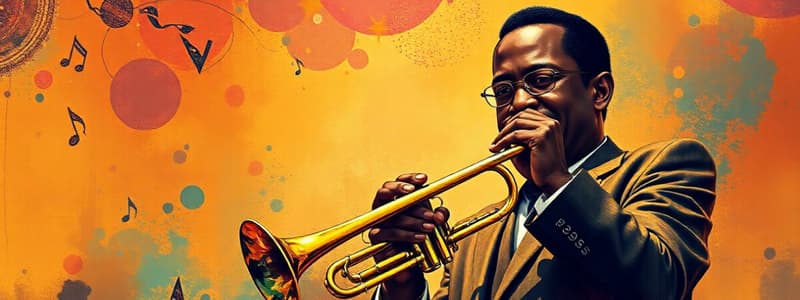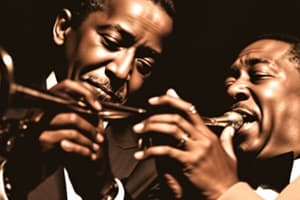Podcast
Questions and Answers
Which of the following styles of music did jazz incorporate elements from?
Which of the following styles of music did jazz incorporate elements from?
- European classical music
- American blues
- South American music
- All of the above (correct)
What city is considered the birthplace of jazz?
What city is considered the birthplace of jazz?
New Orleans
Which instrument was NOT commonly used in 1920s Dixieland jazz?
Which instrument was NOT commonly used in 1920s Dixieland jazz?
- Clarinet
- Trumpet
- Electric Guitar (correct)
- Trombone
Cool jazz is characterized by intense passion.
Cool jazz is characterized by intense passion.
Who was instrumental in shaping early jazz styles?
Who was instrumental in shaping early jazz styles?
Which of the following best describes the 1960s Free Jazz movement?
Which of the following best describes the 1960s Free Jazz movement?
Match the jazz style with its description:
Match the jazz style with its description:
Jazz music originated in _____ around 1895.
Jazz music originated in _____ around 1895.
Which decade did Acid Jazz emerge in?
Which decade did Acid Jazz emerge in?
Flashcards are hidden until you start studying
Study Notes
Jazz Music
- Jazz originated in New Orleans around 1895
- Jazz was developed by black musicians and was initially an outlet for self-expression
- Jazz borrowed elements from European classical music, American blues, and South American music.
- Jazz incorporated ragtime, marching band music, and blues
- Jazz introduced numerous new dance styles including the Charleston, black bottom, tango, shimmies, and the trot.
- Louis Armstrong was an instrumental figure in shaping early jazz styles.
Jazz History
- 1920s Jazz Age: Known as New Orleans or Dixieland jazz
- Combined elements of the blues, ragtime, and brass band marching beats
- Utilized instruments like trumpet, trombone, and clarinet
- Bands often had 16+ players
- 1930s Era of Swing: Bands became larger (often 16 or more players)
- Focus on smooth rhythms
- Pianists combined improvisation and composed parts within the swing style
- 1940s/1950s Latin Jazz, Hot and Cool Jazz:
- Latin Jazz combined African and Latin American rhythms with U.S. jazz harmonies
- Utilized straight rhythms rather than the "swung" rhythms of earlier styles
- Bebop (or Modern Jazz) emerged with musicians experimenting with complex rhythms and harmonies
- Charlie Parker pioneered bebop
- Cool Jazz was a gentler, more subtle style, without the intense passion of Hot Jazz
- West Coast Jazz was characterized by its impersonal and relaxed nature, influenced by Miles Davis
- Latin Jazz combined African and Latin American rhythms with U.S. jazz harmonies
- 1960s Hard Bop, Soul Jazz, and Free Jazz:
- Hard Bop was an extension of bebop with a slower tempo and varied bass playing
- Art Blakey led the Jazz Messengers
- Soul Jazz emerged from Hard Bop and drew heavily on blues and gospel music.
- Improvisation in soul jazz was less complex than in other jazz styles, focusing on repetitive grooves and melodies.
- Free Jazz (also known as Avant-Jazz) disregarded traditional jazz rules and constraints on harmony and structure, allowing improvisation to vary more widely
- Cecil Taylor was a key figure in the free jazz movement
- 1970s Jazz Fusion:
- Result of the convergence of jazz and rock music
- Jazz solos performed over rock rhythms accompanied by electric guitar and piano
- The Weather Report is an example of jazz fusion
- 1980s/1990s Acid Jazz and Jazz Rap:
- Acid Jazz incorporated aspects of jazz, soul, funk, disco, and hip-hop
- Key acid jazz groups include Jamiroquai, The Brand New Heavies, and James.
- Acid Jazz incorporated aspects of jazz, soul, funk, disco, and hip-hop
Studying That Suits You
Use AI to generate personalized quizzes and flashcards to suit your learning preferences.




